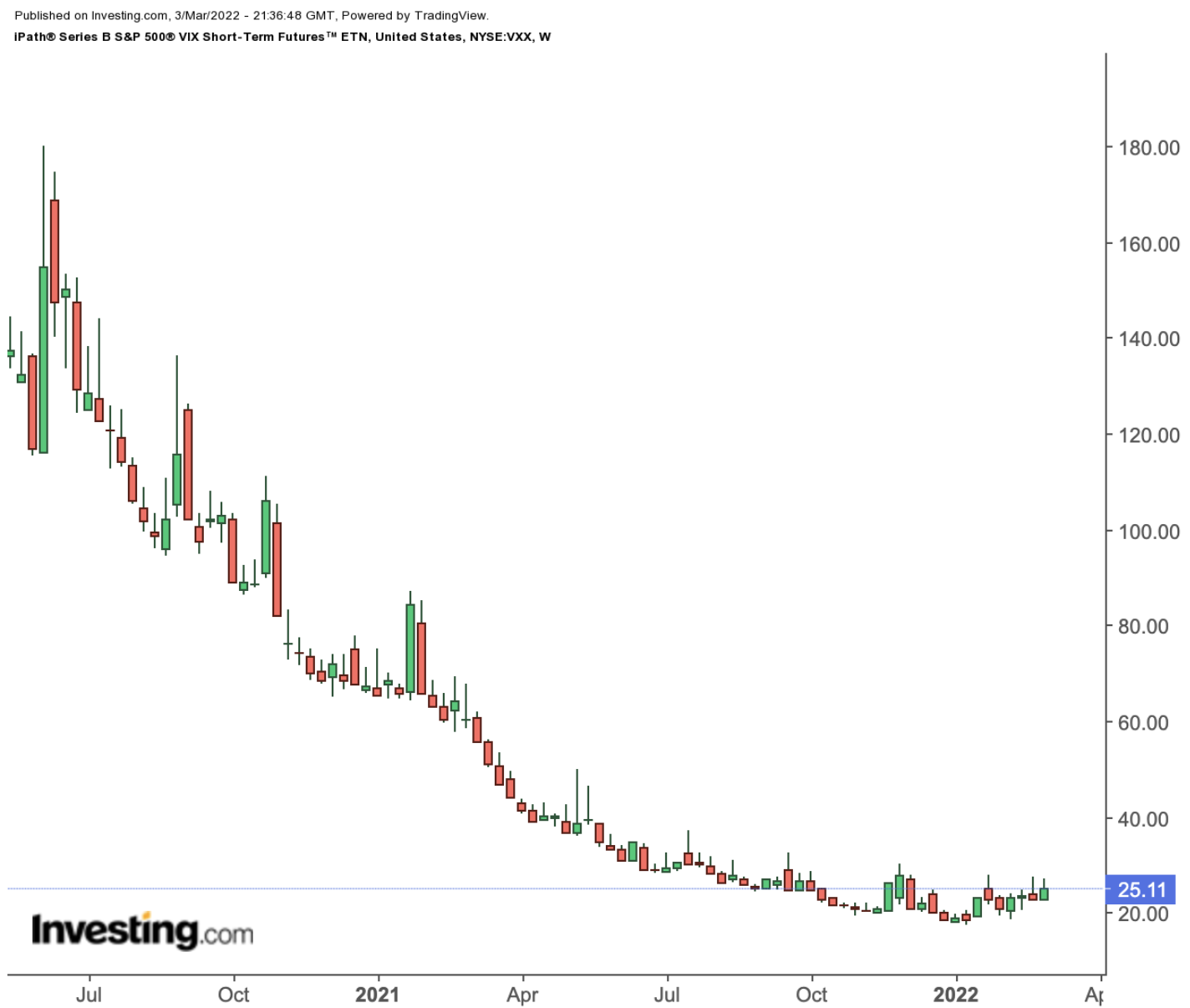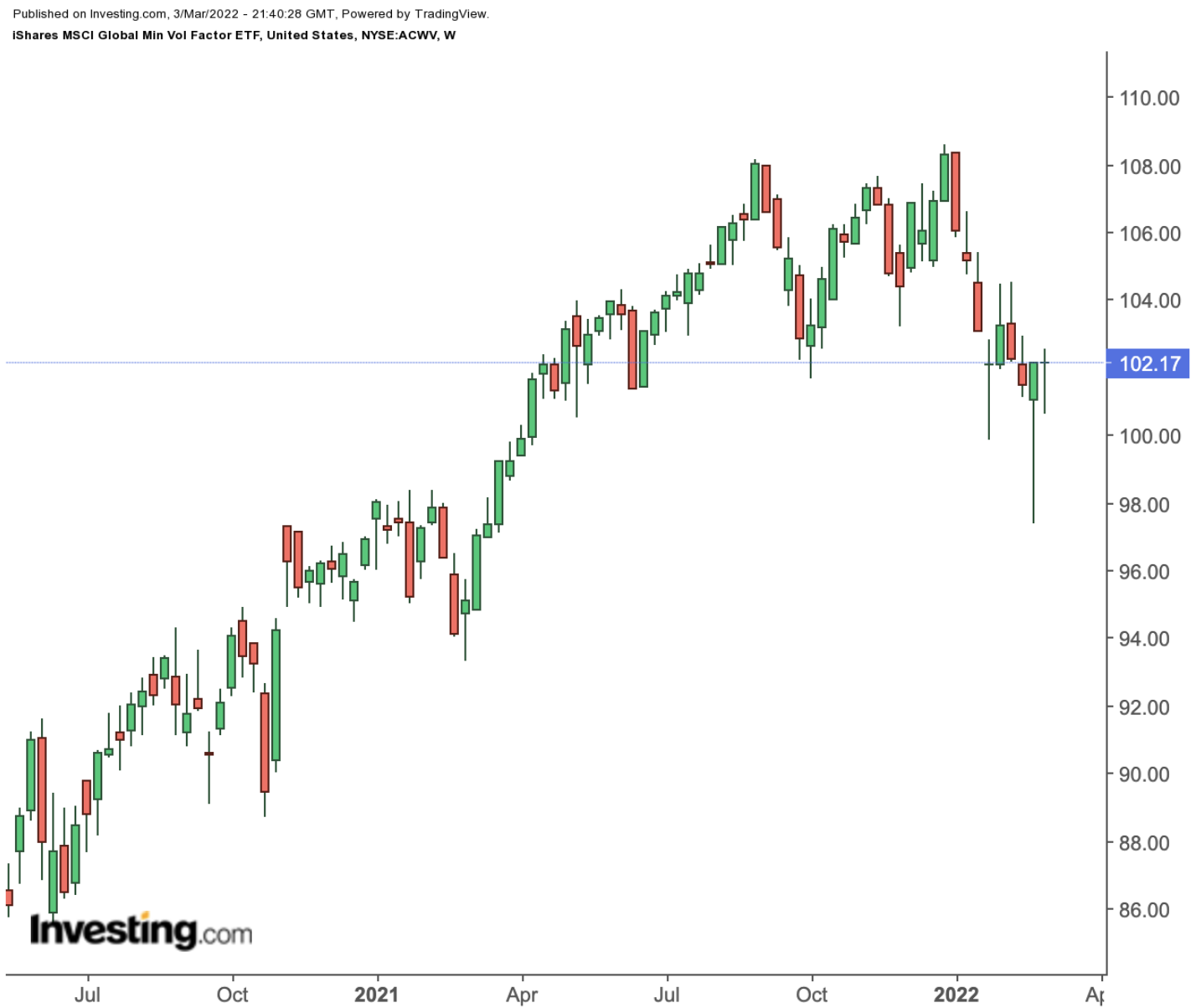A slew of macroeconomic difficulties washed over Wall Street in the first two months of 2022, leading to heightened market volatility. So, investors have been paying close attention to the CBOE Volatility Index (VIX), also known as the “fear index.”
Introduced in 1993, VIX has become a globally recognized gauge of implied volatility in the US equity market. It rallies when volatility increases and the S&P 500 index falls.
The VIX index is currently hovering at 33, up over 10% since the start of 2022. Given the current geopolitical tensions, levels will likely continue to pick up steam in the coming weeks.
Navigating periods of heightened choppiness can be nerve-racking for some investors. However, portfolio diversification could offer an efficient investment strategy to mitigate risks when volatility rises. In addition, numerous exchange-traded products (ETPs) can be helpful to participate in short-term moves and to build long-term portfolios.
Today, we’ll first look at an exchange-traded note (ETN) that could be appropriate, especially for experienced short-term traders. Then we’ll introduce an exchange-traded fund (ETF) that could appeal to many retail investors. Let’s dive in.
1. iPath S&P 500 VIX Short-Term Futures ETN
- Current Price: $25.11
- 52-Week Range: $17.30 - $69.16
- Expense ratio: 0.89% per year
The iPath® Series B S&P 500® VIX Short-Term Futures™ ETN (NYSE:VXX) is an unsecured debt obligation issued by Barclays. This ETN aims to achieve a daily return that matches the daily moves in short-term futures contracts tracking the VIX index.

VXX was listed in early 2018 with a maturity date of Jan. 2048. It tracks the S&P 500 VIX Short-Term Futures Total Return Index.
The methodology of the index correlates with the VIX index’s spot price. As VXX’s recent price action has shown, it usually rises in value when stocks fall during the trading day.
So, this ETN could be a tool for traders to hedge their equity portfolios against a market decline in the short term. Put another way, when equity markets are stable or rise, VXX generally declines.
We should remind readers that if a volatility-based ETN is held for more than one day, returns (both positive and negative) become compounded. Therefore, VXX is not an appropriate long-term addition to a retail portfolio.
So far this year, VXX is up 35.5%. Bearish equity traders who anticipate a further increase in market volatility should consider using VXX for short periods in the market.
2. iShares MSCI Global Min Vol Factor ETF
- Current Price: $102.17
- 52-Week Range: $93.33 - $108.60
- Dividend Yield: 2.03%
- Net Expense Ratio: 0.20% per year
Our next fund choice for today is the iShares MSCI Global Min Vol Factor ETF (NYSE:ACWV). It invests in global shares that have low volatility. The ETF started trading in October 2011.

ACWV, which tracks the MSCI All Country World Minimum Volatility Index, currently has 399 holdings. The top 10 stocks in the fund account for roughly 13% of almost $5.25 billion net assets.
More than half of the companies come from the US, followed by Japan (10.21%), Switzerland (5.94%), Taiwan (4.99%), and China (4.34%).
In terms of sectoral allocations, we see information technology (17.51%), healthcare (15.72%), communication (14.36%), consumer staples (12.10%), and financials (9.75%), among others.
Leading holdings in the portfolio include Verizon Communications (NYSE:VZ); Switzerland-based healthcare heavyweight Roche (OTC:RHHBY) and consumer products giant Nestle (OTC:NSRGY); Waste Management (NYSE:WM), and gold miner Newmont Goldcorp (NYSE:NEM).
The ETF has returned over 7.2% over the past year and hit a record high in late December. Yet, it is down close to 5.6% since January. Trailing price-to-earnings (P/E) and price-to-book (P/B) ratios stand at 21.26x and 3.15x.
The fund’s unique diversification in terms of geography and sectors could help lower long-term portfolios. Therefore, it deserves your attention. Potential investors could regard any further decline as an opportunity to enter ACWV.
Which stock should you buy in your very next trade?
With valuations skyrocketing in 2024, many investors are uneasy putting more money into stocks. Unsure where to invest next? Get access to our proven portfolios and discover high-potential opportunities.
In 2024 alone, ProPicks AI identified 2 stocks that surged over 150%, 4 additional stocks that leaped over 30%, and 3 more that climbed over 25%. That's an impressive track record.
With portfolios tailored for Dow stocks, S&P stocks, Tech stocks, and Mid Cap stocks, you can explore various wealth-building strategies.
